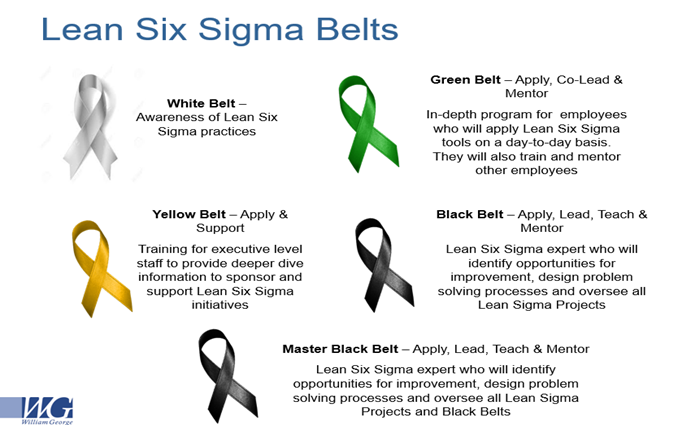Lean Six Sigma Certifications

By Kevin M. Yonge – January 31, 2023
“We thought we had fixed the quality issue, but it’s still broken!” Sound familiar? Perhaps these issues might include late deliveries, supplier quality issues, data entry errors, difficulties in adjusting to new regulatory requirements, unacceptable defect/scrap rates, lack of standardization, etc.
Too many times, businesses expend money and resources into improving performance, only to discover that little, if anything has changed. Why? Most often, this is due to a lack of a structured approach to Root Cause Problem Solving (RCPS). Identifying and eliminating the root cause of the problem can have a significant impact on performance and reclaim lost money and resources expended in a futile attempt to improve. These monies and resources can now be reinvested in the business.
But what is the most effective structured approach to Operational Excellence? William George Associates’ (WGA) Certified Lean Six Sigma Belt training gives students the critical knowledge to apply core tools and concepts that provide a positive financial impact on their organization and drives customer satisfaction.
The Lean Six Sigma Belt Certification courses are a complete training offering for professionals who want to learn the tools of Lean Six Sigma which help drive waste and lost opportunity from business operations.
The Lean Six Sigma Belt Certificate programs allow students to complete certification requirements for one of the most popular credentials in business today in a cost-effective manner.
Lean Six Sigma combines two of the most powerful improvement methodologies in modern history—Six Sigma (variation reduction and defect elimination via the D.M.A.I.C. methodology) and Lean (the identification and elimination of sources of waste in a system: TIMWOODS). These courses are designed for business professionals looking to enhance their value to organizations that need to optimize critical business processes and enhance a culture of continuous improvement.
All course materials and Lean Six Sigma Belt Certification exam fees are included in the program registration fee.
Lean Six Sigma Certificate students are eligible for PDUs for Project Management Institute (PMI) certification.
No prerequisites required.
Students receive a comprehensive education that includes:
- An understanding of Lean and Six Sigma concepts and tools, the hybrid methodology that combines the best of two successful process improvement systems.
- How to define, scope, lead and execute DMAIC (Define, Measure, Analyze, Improve, Control) /Lean projects and Kaizen events that are suitable for Belt skill-level and time commitment.
- Hands-on experience with actual live projects with tools such as Data Gathering, Project Charters, Project Scoping, Value Stream Mapping, Process Mapping, and Statistical Data Analysis. Businesses/organizations benefit directly through course project completion.
- Apply Lean concepts and tools to identify and eliminate/minimize sources of waste in a process.
- Develop and manage Key Performance Indicators (KPIs) reporting to ensure sustainability of improvement activities.
WGA offers comprehensive training and certifications for the various Lean Six Sigma Belt levels including:
Program Title: Lean Six Sigma Black Belt Certification
Duration: 8-days (64-hours) lecture plus 60 hours project work This course provides 124 PDUs for eligible PMPs: 40- Technical; 40-Leadership; 44- Strategic and business
Program Description: A Certified Lean Six Sigma Black Belt (CLSSBB) is among the most sought-after professional skills in any industry today. As a Lean Sis Sigma Black Belt, your expertise of Lean Six Sigma techniques and strategies can significantly contribute to the organization’s bottom line and more importantly, meet customer expectations. Lean Six Sigma addresses the best of both worlds, Lean (identification and elimination of waste), and Six Sigma (elimination of variation and defects). As a Black Belt, you will lead and mentor other colleagues in a Continuous Improvement Program, work with management and process owners to identify opportunities for improvement project initiatives and manage a portfolio of Lean Six Sigma projects consistent with business strategy needs. Typically, a full-time position, the CLSSBB plays a significant role with a focus on improving quality, productivity, cost reduction, and revenue.
Who should take this course? WGA’s Lean Six Sigma Black Belt Certification course is designed for individuals, managers, engineers, process owners, directors, etc. seeking to become experts in Continuous Improvement initiatives within an organization. Attaining a CLSSBB Certification adds value to both the individual as well as the organization, including Scrum Masters, Product Owners, Project/Program Managers, and/or Team Members. However, any organization or anyone within an organization looking to become more effective in the development and delivery of its products and services can gain valuable knowledge and insight by taking this course. With completion of the course, participants will be prepared to help move your organization forward using Lean Six Sigma principles.
Program Title: Lean Six Sigma Green Belt Certification
Duration: 5-days; 37.5 hours This course provides 37.5 PDUs for eligible PMPs (15- Technical; 15-Leadership; 7.5- Strategic and business)
Program Description: The Lean Six Sigma Green Belt Certification course is a 5-day course for professionals who want to learn the tools of Lean Six Sigma which help drive waste and lost opportunity from business operations. It includes the following elements: • End-of-Section quizzes are provided to reinforce subject matter content and interactiv3 content exercises provide a deeper review of concepts; • Students will lead an actual company-based and approved Green Belt-Level improvement project that will directly benefit their organization; • On the final day of the course, students will present their certification projects and complete a Certification Exam.
Who should take this course? This course is intended for professionals who wish to learn about the knowledge skills and tools associated with Lean Six Sigma and apply them while leading Green Belt projects. Students will be able to perform value stream mapping exercises and successfully manage corporate continuous improvement projects.
Program Title: Lean Six Sigma Yellow Belt Certification
Duration: 2-days; 14 hours This course provides 13 PDUs for eligible PMPs: 4-Technical; 5- Leadership; 5- Strategic and business
Program Description: The Lean Six Sigma Yellow Belt program allows Executives and Managers to understand and support Lean Six Sigma initiatives in an organization dedicated to continuous improvement. Lean Six Sigma combines two of the most powerful improvement methodologies in modern history – Six Sigma and Lean. This course is designed for business professionals looking to enhance their value to organizations that need to optimize critical business processes and enhance a culture of continuous improvement.
Who should take this course? WGA’s Lean Six Sigma Yellow Belt Certification course is designed for individuals seeking to become certified Lean Six Sigma Yellow Belt practitioners, Product Owners, Project/Program Managers, and/or Team Members. However, any organization or anyone within an organization looking to become more effective in the development and delivery of its products and services can gain valuable knowledge and insight by taking this course. With completion of the course, participants will be prepared to help move your organization forward using Lean Six Sigma principles.
Program Title: Lean Six Sigma White Belt Certification
Duration: ½ day; 4 hours
This course provides 4 PDUs for eligible PMP’s (4-Technical)
Program Description:
The Lean Six Sigma White Belt Certification course is a 1/2-day energetic, hands-on course offering professionals valuable knowledge, skills, and credentials. WGA has crafted Lean Six Sigma White Belt training and consulting services to assist clients in becoming closer to their customers by teaching how to accurately define what customers want and why. The Six Sigma White Belt is a course designed to provide the most basic level of understanding of the Lean Six Sigma Methodology. It aims to provide a basic definition, history, and structure of the discipline. Who should take this course? WGA’s Lean Six Sigma White Belt Certification course is designed for individuals seeking to enhance their value to an organization and contribute to an organization’s Continuous Improvement program. With completion of the course, participants will be prepared to actively participate in Kaizen Events and provide their process knowledge to the project.
Who should take this course? WGA’s Lean Six Sigma White Belt Certification course is designed for individuals seeking to enhance their value to an organization and contribute to an organization’s Continuous Improvement program. With completion of the course, participants will be prepared to actively participate in Kaizen Events and provide their process knowledge to the project.
Gold Belt- for Executives/Sponsors/Senior Management
Duration: Consulting-based with a Certified Lean ix Sigma Black Belt Mentor
This course provides xx PDUs for eligible PMP’s (xx-Technical, xx- Leadership; xx- Strategic and business)
Program Description:
WGA’s Lean Six Sigma Gold Belt Certification (a WGA exclusive) is designed for Business Executives, Sponsors, Senior Management and Business Decision-makers responsible for the development and deployment of the business-wide Strategic Plan (Hoshin Kanri). Students will be exposed to methodologies employed in a one-, two-, three-, and five-year plan.
Who should take this course? WGA’s Lean Six Sigma Gold Belt Certification course is designed for business professionals seeking to enhance their knowledge of Strategic Planning and Deployment. Students will develop the business-wide Strategic Plan (Hoshin Kanri) and are introduced to various planning tools with an emphasis on the X-Matrix Tool. Upon completion, students will have developed a Strategic Objectives and Deployment Plan for their actual organization.

